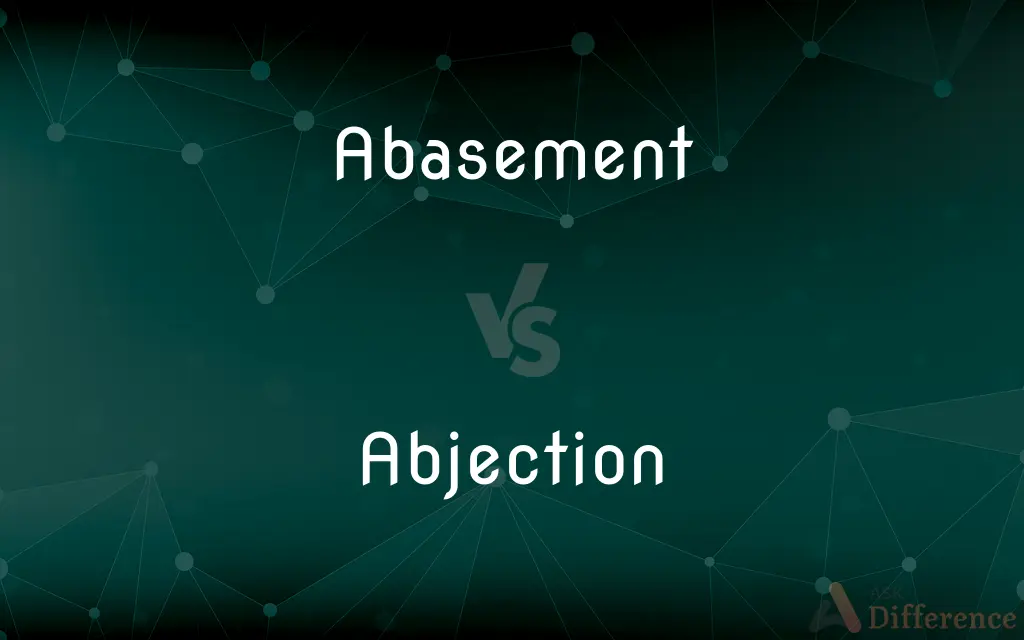Abasement vs. Abjection — What's the Difference?
By Tayyaba Rehman — Published on October 3, 2023
Abasement refers to the act of reducing in rank, prestige, or esteem; Abjection denotes a low or downcast state, often involving degradation or dejection.

Difference Between Abasement and Abjection
Table of Contents
ADVERTISEMENT
Key Differences
Abasement and Abjection, while both depicting states of lowliness or degradation, convey different nuances in their meanings. Abasement primarily refers to the act of being lowered in rank, prestige, or esteem, suggesting a reduction in status, often due to humiliation or demeaning treatment. On the other hand, Abjection is more about a state of being cast off, depicting extreme degradation, meanness, and the experience of being in a low or downcast state, often laced with shame or disgrace.
In terms of interaction, abasement typically implies an external influence or action causing one to experience a lowering in dignity or stature. It can be the result of one’s actions resulting in humiliation or could be imposed by others, diminishing one’s self-worth or position. Conversely, abjection often is more about one's internal feelings of worthlessness or degradation, potentially stemming from one’s own feelings or perceptions of disgrace, without necessarily being imposed by external factors.
The context in which abasement occurs often involves a discernible action or event leading to the lowering of status or esteem, such as a demotion at work or a public reprimand, affecting one’s social or professional standing. In contrast, abjection is more aligned with a pervasive state of misery or debasement, possibly resulting from self-loathing or profound humiliation, impacting one’s psychological or emotional wellbeing.
While abasement may be reversible, where one may regain lost status or esteem through rectification or change in circumstances, abjection often implies a more entrenched and enduring state of despair or degradation, potentially harder to overcome. Abasement can be transient, affecting one’s position or reputation temporarily, while abjection tends to depict a more enduring and profound state of lowliness and wretchedness.
In summation, while both words convey a sense of lowering, abasement is more about the act of being brought low, usually by external influences or actions, affecting status or reputation; abjection is more about experiencing a state of extreme lowliness or degradation, often internally perceived, impacting one’s emotional or psychological state.
ADVERTISEMENT
Comparison Chart
Definition
The act of being lowered in rank, prestige, or esteem.
A state of extreme degradation or lowliness.
Implication
Often involves external action or influence.
Primarily an internal state of being.
Impact
Affects status or reputation, can be transient.
More enduring, affects emotional or psychological state.
Contextual Occurrence
Occurs due to discernible actions or events.
A pervasive state of misery or debasement.
Possibility of Reversal
Potentially reversible through change in circumstances.
Often implies a more entrenched and enduring state.
Compare with Definitions
Abasement
The action or result of being brought low in condition or status.
The employee faced abasement after violating company policies.
Abjection
The condition of being in severe humiliation or subservience.
Living in abjection, he struggled daily with his sense of self-worth.
Abasement
The state of being humiliated or degraded.
The public figure endured abasement after a downfall in his career.
Abjection
The state of being cast off or in degradation.
The prisoner lived in a state of abjection, devoid of hope or dignity.
Abasement
The act of lowering in rank, esteem, or reputation.
His public abasement was a result of his wrongdoings coming to light.
Abjection
A low or downcast state often involving extreme disgrace or shame.
The individual suffered from abjection due to relentless feelings of worthlessness.
Abasement
Reduction to a lower state, rank, or degree due to humiliating circumstances.
The abasement of the politician followed a series of scandals.
Abjection
A state of misery characterized by loss of esteem or dignity.
Many people in war-torn regions live in constant abjection.
Abasement
A condition of being lowered in dignity or self-worth.
The abasement he felt after being reprimanded was overwhelming.
Abjection
A deep state of degradation stemming from despair or self-loathing.
The profound abjection he felt was a result of years of self-deprecation.
Abasement
To lower in rank, prestige, or esteem.
Abjection
The term abjection literally means "the state of being cast off". The term has been explored in post-structuralism as that which inherently disturbs conventional identity and cultural concepts.
Abasement
The act of abasing, humbling, or bringing low.
Abjection
Extremely contemptible or degrading
Abject cowardice. ].
Abasement
The state of being abased or humbled; humiliation.
Abjection
A low or downcast condition; meanness of spirit; abasement; degradation.
An abjection from the beatific regions where God, and his angels and saints, dwell forever
Abasement
The act of abasing, humbling, or bringing low; the state of being abased or humbled; humiliation.
Abjection
Something cast off; garbage.
Abasement
A low or downcast state;
Each confession brought her into an attitude of abasement
Abjection
(obsolete) The act of bringing down or humbling; casting down.
The abjection of the king and his realm.
Abasement
Depriving one of self-esteem
Abjection
(obsolete) The act of casting off; rejection.
Abjection
The act of dispersing or casting off spores.
Abjection
The act of bringing down or humbling.
Abjection
The state of being rejected or cast out.
An abjection from the beatific regions where God, and his angels and saints, dwell forever.
Abjection
A low or downcast state; meanness of spirit; abasement; degradation.
That this should be termed baseness, abjection of mind, or servility, is it credible?
Abjection
A low or downcast state;
Each confession brought her into an attitude of abasement
Common Curiosities
What does abasement refer to?
Abasement refers to the act of being lowered in rank, prestige, or esteem, often due to humiliating circumstances.
Is abasement always caused by external factors?
Abasement often implies external influence or actions, but it can also be self-imposed due to one's actions leading to humiliation.
Can abasement affect one’s professional standing?
Yes, abasement can affect one’s professional standing, such as through a demotion or public reprimand, impacting reputation or status.
Can abasement be temporary?
Yes, abasement can be transient, affecting one’s position or reputation temporarily.
What is the meaning of abjection?
Abjection denotes a state of extreme degradation or lowliness, often involving extreme disgrace or shame.
Does abjection represent a transient state?
Abjection usually represents a more enduring and profound state of lowliness and degradation, often harder to overcome.
Is abjection always associated with shame or disgrace?
While abjection often involves feelings of shame or disgrace, it fundamentally denotes a state of extreme degradation or lowliness.
Can one regain lost esteem after abasement?
Yes, abasement can be reversible, and one may regain lost esteem through rectification or change in circumstances.
Is abjection primarily about one’s internal state?
Yes, abjection primarily relates to one's internal feelings of worthlessness or degradation, impacting one’s psychological or emotional wellbeing.
Can the term abasement apply to situations involving a reduction in condition or status?
Yes, abasement applies to situations where there is a reduction in condition, status, or rank due to humiliating circumstances.
Does abjection necessarily imply the presence of external influences?
No, abjection is more about an internal state of being and does not necessarily involve external influences.
Share Your Discovery

Previous Comparison
Illegitimate vs. Illegal
Next Comparison
Controllable Costs vs. Non Controllable CostsAuthor Spotlight
Written by
Tayyaba RehmanTayyaba Rehman is a distinguished writer, currently serving as a primary contributor to askdifference.com. As a researcher in semantics and etymology, Tayyaba's passion for the complexity of languages and their distinctions has found a perfect home on the platform. Tayyaba delves into the intricacies of language, distinguishing between commonly confused words and phrases, thereby providing clarity for readers worldwide.














































